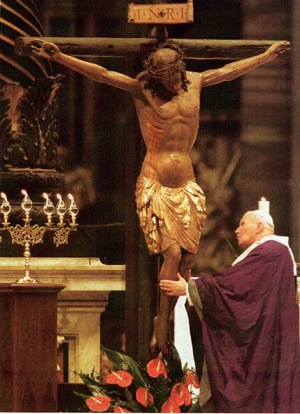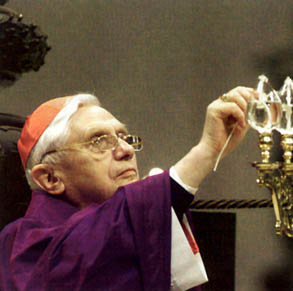 |
A Column of Catholic Orientation
The Bad Effects of the Papal Apologies
Marian T. Horvat, Ph.D.
My friend Jan was not convinced that the latest papal apology for the Inquisition (see last article) was really so harmful to the Church.
“Even if the Inquisition was not as bad as historians have portrayed it, there were still some abuses. Doesn’t it show humility and honesty on the part of the Pope to ask pardon for the wrong things the Church may have done?” Jan argued. “Doesn’t it set a good example for us, since that’s what we teach our children to do – apologize when we do something wrong?”

March 12, 2000 - JPII asked pardon for the Church's past militancy Inside the Vatican, January 2001 |
Her comment unknowingly illustrates the exact point I would like to highlight. This apology, as well as the more than 100 others that John Paul II has made for the supposed wrongdoings of the Church, are presenting a new and false progressivist notion of what the Church is. The Church, in fact, does not “do wrong things,” as papal apologies induce the faithful to think.
The Church, as an institution, is pure and sinless, founded by Christ and preserved by God to be free of error, both in the past and in the present. It is only individual Church members, be they Popes, Bishops or the simple faithful, who sin.
This is the authentic teaching of the Church, Jan, as you and I learned it. But do your children or their friends realize this? Or is there some confusion in their minds caused by the constant papal apologies for the past “sins of the Church”? If you analyze these apologies carefully, you can see that most of them insert a short line, a footnote, or a parenthetical phrase attributing the fault to the members of the Church. For the scholars and theologians, therefore, the rule is maintained: no error of the Church but only of her members. However, it is the general line of the apology that normally remains in the minds of the faithful: the Church is sinful. In face of this contradiction, one cannot help but wonder: Is it the Vatican’s intention to cause this second impression?
At any rate, what sticks in the mind of so many Catholics, especially young ones schooled in “Vatican II catechism,” is that the Church made mistakes and even sinned in her past, so now the correct action for the Church is to repent and do penance. This would justify the continuous reform in customs and institutions we have seen since Vatican II. It explains why the Church would supposedly need new structures, because the old would be inherently flawed.
If we had a contaminated Church, which we do not, then we have a Church in need of evaluation and change, uncertain in her teaching. Yesterday she made a mistake. Today she corrects it and repents for her past. Tomorrow, well, who knows what tomorrow will bring as the Church evolves?

At the same ceremony Card. Ratzinger lights a lamp asking pardon for sins of intolerance
Inside the Vatican, January 2001 |
This notion of a sinning Church that the progressivists inculcate in the spirit of the naïve faithful, is affirmed in documents of Vatican II. Lumen gentium, for example, states the Church is “at the same time holy and always in need of being purified,” that she must always pursue “the path of penance and renewal.” (LG 8).
It is not difficult to understand from this that the Church would need a continual reform, as interpreted by Karl Rahner and Yves Congar and so many other progressivist ecclesiastics. Such theologians, suspect for heresy before Vatican II, have suddenly become the experts who cannot be questioned, even though their bad theology did not change. They are the ones who need to make apologies for their past and repent. But they have not. Instead, they are demanding the Church do exactly that: make apologies for her past and repent.
When the Pope apologizes for the past sins of the Church, he does not appear at all like one being humble and honest. He is implicitly affirming a new conception of the Church, and also the Faith, one constantly reforming, changing, and evolving.
I hope this explains, Jan, why there is something profoundly wrong with the Pope’s apology for the Inquisition and for so many other past militant actions of the Holy Catholic Church.

Posted on September 30, 2004
|
Talks with Jan | Religious | Home | Books | CDs | Search | Contact Us | Donate

© 2002-
Tradition in Action, Inc. All Rights Reserved
|
 |
|